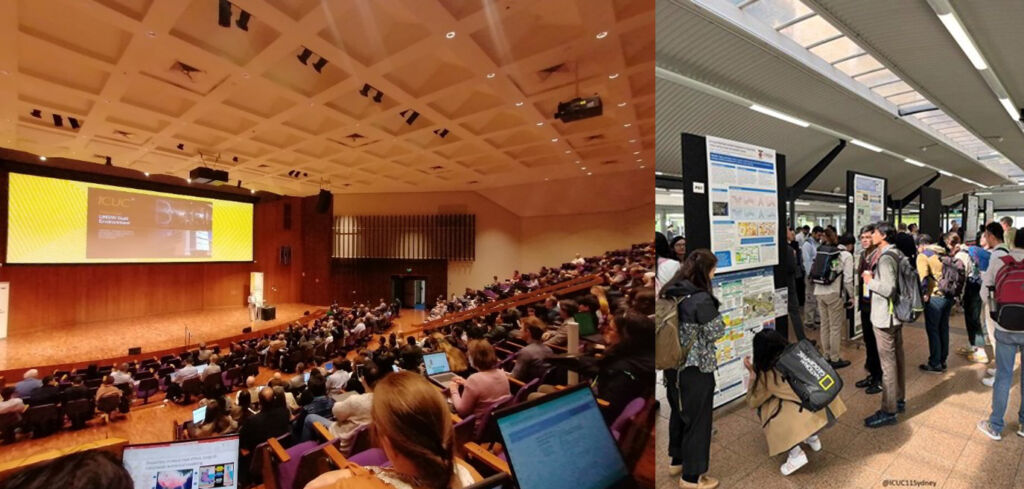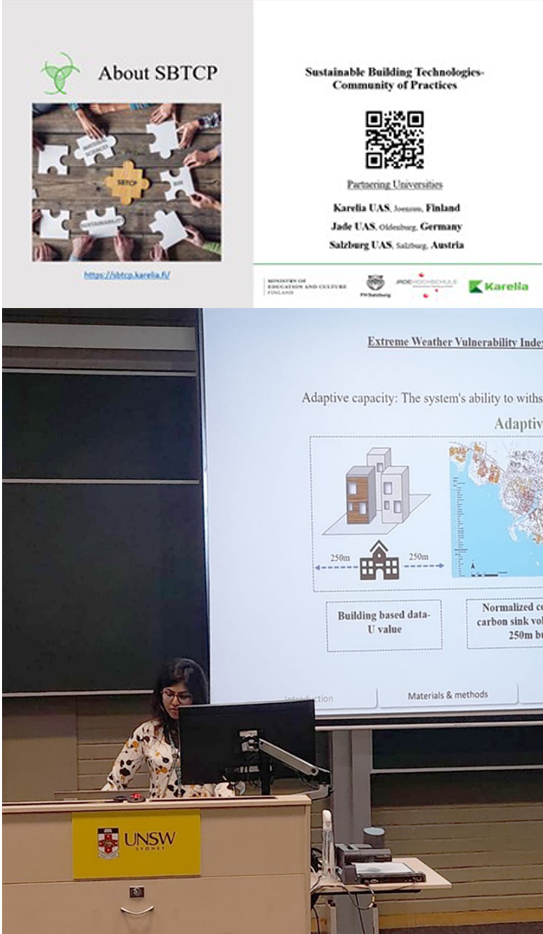The ICUC meetings are preeminent events for the presentation of research on urban climate, at all scales. This conference brings together a diverse international community of researchers, urban planners, designers, and policymakers.
The World Meteorological Organization (WMO) and the International Federation for Housing and Planning (IFHP) both ran successful international conferences on urban climate between the 1960s-80s. In 1989, these endeavours came together in the form of joint meetings under the name International Conference on Urban Climatology (ICUC). ICUC conferences are now held every 3 years and bring together more than 600 delegates from 55 countries.
This year the 11th ICUC conference was held in Sydney, Australia, and successfully brought together delegates from more than 60 nationalities. Shammi Keya from Karelia UAS presented research findings supported by the ‘Sustainable Building Technologies- Community of Practice’ (SBTCP) project titled ‘Built Environment and Urban Micro-climate: Integrating Urban Built Environment and Micro-Climatic Effect Analysis for Energy Planning in Cities’.

Karelia UAS’s research presentation in the ICUC11
The conference activities started on the 27th of August with a workshop on data visualization, which was then followed by five days of informative sessions on topics addressing climate change, adaptation, mitigation, and resilience in building and urban scale.
The wide range of topics started from sessions on ‘Multiscale modeling techniques to document and respond to urban climate change’, ‘Urban climate methods: Cities in global and regional scale climate models’, ‘Integrated assessments of urban climate: Urban climate vulnerability in developing countries’, ‘Urban climate processes: Extreme weather and disasters in the urban environment’, ‘Climate change, Built Environment and Aging Society’, ‘Biometeorology & health: Indoor/Outdoor Thermal comfort’, ‘The cooling benefits of blue and green infrastructure in cities’, ‘Extreme weather and climate in urban areas, their social impacts, and mitigation’, ‘Climate-conscious urban design and planning for adaptation’, ‘Australian stories: Urban heat- Supercool materials for urban overheating mitigation’- research perspective. ‘Local government and urban climate management/ Exploring co-benefits of integrated low-carbon urban planning initiatives’, ‘Urban climate and air pollution’, ‘Physiological impacts of urban heat’, and ‘Climate-conscious design and sustainable development: Building climates & performance’.

The topics presented/discussed addressed the urban heat islands; as with the changing climatic conditions, the excessive heat waves in the urban areas are the most alarming and noticeable phenomena, especially in warmer climate countries. The professionals and researchers addressed several questions: Are some areas within cities becoming unliveable? What solutions are viable? What is the heat mitigation and adaptation in the built environment? What are the implementation possibilities of these techniques? How to ensure thermal comfort both indoors and outdoors? How to reduce GHG emissions through policy-making, building design adaptation, and energy planning in cities? – were asked. The sessions explored these questions from research and implementation perspective, focusing on the status of adaptation, mitigation, and heat-related health outcomes and preparedness in different cities worldwide.
However, the need for zero energy development is crucial in cold and warm climate countries; resulting in more emphasis on systematic district heating and cooling on a city scale. Analyzing how different built environments can react to respective external climatic conditions holds immense potential to develop resilience for potential extreme weather events. A better understanding of the micro-climate, socio-demographic conditions, and the system’s ability to withstand and adapt can potentially contribute to better climate-conscious design and planning in cities.
Author:
Shammi Akter Keya, Project Researcher, Karelia University of Applied Sciences
Cover photo: wirestock on Freepik

